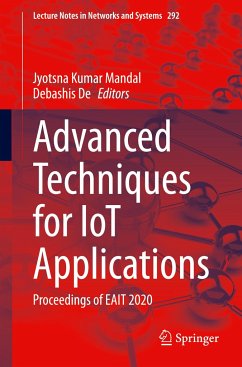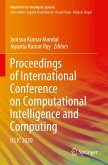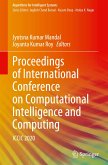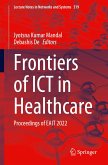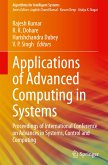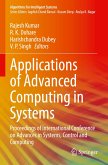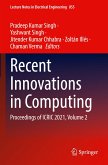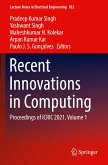Advanced Techniques for IoT Applications
Proceedings of EAIT 2020
Herausgegeben:Mandal, Jyotsna Kumar; De, Debashis
Advanced Techniques for IoT Applications
Proceedings of EAIT 2020
Herausgegeben:Mandal, Jyotsna Kumar; De, Debashis
- Broschiertes Buch
- Merkliste
- Auf die Merkliste
- Bewerten Bewerten
- Teilen
- Produkt teilen
- Produkterinnerung
- Produkterinnerung
This book includes original, unpublished contributions presented at the Sixth International Conference on Emerging Applications of Information Technology (EAIT 2020), held at the University of Kalyani, Kalyani, West Bengal, India, on November 2020. The book covers the topics such as image processing, computer vision, pattern recognition, machine learning, data mining, big data and analytics, information security and privacy, wireless and sensor networks, and IoT. It will also include IoT application-related papers in pattern recognition, artificial intelligence, expert systems, natural…mehr
Andere Kunden interessierten sich auch für
![Proceedings of International Conference on Computational Intelligence and Computing Proceedings of International Conference on Computational Intelligence and Computing]() Proceedings of International Conference on Computational Intelligence and Computing161,99 €
Proceedings of International Conference on Computational Intelligence and Computing161,99 €![Proceedings of International Conference on Computational Intelligence and Computing Proceedings of International Conference on Computational Intelligence and Computing]() Proceedings of International Conference on Computational Intelligence and Computing161,99 €
Proceedings of International Conference on Computational Intelligence and Computing161,99 €![Frontiers of ICT in Healthcare Frontiers of ICT in Healthcare]() Frontiers of ICT in Healthcare201,99 €
Frontiers of ICT in Healthcare201,99 €![Applications of Advanced Computing in Systems Applications of Advanced Computing in Systems]() Applications of Advanced Computing in Systems121,99 €
Applications of Advanced Computing in Systems121,99 €![Applications of Advanced Computing in Systems Applications of Advanced Computing in Systems]() Applications of Advanced Computing in Systems121,99 €
Applications of Advanced Computing in Systems121,99 €![Recent Innovations in Computing Recent Innovations in Computing]() Recent Innovations in Computing185,99 €
Recent Innovations in Computing185,99 €![Recent Innovations in Computing Recent Innovations in Computing]() Recent Innovations in Computing177,99 €
Recent Innovations in Computing177,99 €-
-
-
This book includes original, unpublished contributions presented at the Sixth International Conference on Emerging Applications of Information Technology (EAIT 2020), held at the University of Kalyani, Kalyani, West Bengal, India, on November 2020. The book covers the topics such as image processing, computer vision, pattern recognition, machine learning, data mining, big data and analytics, information security and privacy, wireless and sensor networks, and IoT. It will also include IoT application-related papers in pattern recognition, artificial intelligence, expert systems, natural language understanding, image processing, computer vision, applications in biomedical engineering, artificial neural networks, fuzzy logic, evolutionary optimization, data mining, Web intelligence, intelligent agent technology, virtual reality, and visualization.
Produktdetails
- Produktdetails
- Lecture Notes in Networks and Systems 292
- Verlag: Springer / Springer Nature Singapore / Springer, Berlin
- Artikelnr. des Verlages: 978-981-16-4434-4
- 1st ed. 2022
- Seitenzahl: 632
- Erscheinungstermin: 3. August 2021
- Englisch
- Abmessung: 235mm x 155mm x 34mm
- Gewicht: 943g
- ISBN-13: 9789811644344
- ISBN-10: 9811644349
- Artikelnr.: 62083489
- Herstellerkennzeichnung Die Herstellerinformationen sind derzeit nicht verfügbar.
- Lecture Notes in Networks and Systems 292
- Verlag: Springer / Springer Nature Singapore / Springer, Berlin
- Artikelnr. des Verlages: 978-981-16-4434-4
- 1st ed. 2022
- Seitenzahl: 632
- Erscheinungstermin: 3. August 2021
- Englisch
- Abmessung: 235mm x 155mm x 34mm
- Gewicht: 943g
- ISBN-13: 9789811644344
- ISBN-10: 9811644349
- Artikelnr.: 62083489
- Herstellerkennzeichnung Die Herstellerinformationen sind derzeit nicht verfügbar.
Professor J.K. Mandal received his M.Sc. in Physics from Jadavpur University in 1986 and M.Tech. in Computer Science from the University of Calcutta and was awarded a Ph.D. in Computer Science and Engineering by Jadavpur University in 2000. Currently, he is Professor of Computer Science and Engineering and was Dean of the Faculty of Engineering, Technology, and Management, Kalyani University, West Bengal, for two consecutive terms. He started his career as Lecturer at NERIST, Arunachal Pradesh, in September 1988 and has 30 years of teaching and research experience. His research areas include coding theory, data and network security, remote sensing and GIS-based applications, data compression, error correction, visual cryptography, steganography, security in MANET, wireless networks, and unified computing. He has been Life Member of the Computer Society of India since 1992, CRSI since 2009, ACM since 2012, IEEE since 2013 and Fellow of IETE since 2012. He has chaired more than 60 sessions at various international conferences and delivered more than 60 experts/invited lectures during the last 5 years. He has acted Program Chair of several international conferences and edited more than 30 proceedings volumes. He is Reviewer for various international journals and conferences and has published over 360 articles. He is one of the editors for the Springer AISC and CCIS Series. He has published more than 450 articles, out of which 160 papers are published in the international journal. He has authored 12 books. Twenty-four scholars were awarded Ph.D. degrees under his supervision. Professor Debashis De is Director of the School of Computational Science and Professor Department of Computer Science and Engineering, of the Maulana Abul Kalam Azad University of Technology, West Bengal, India. He is Adjunct Research Fellow at the University of Western Australia, Australia. The Department of Science and Technology awarded him the prestigious Boys cast Fellowship, Government of India, to work at the Herriot-Watt University, Scotland, UK. He received the Endeavour Fellowship Award from 2008-2009 by DEST Australia to work at the University of Western Australia, Perth. He received the Young Scientist Award both in 2005 at New Delhi and in 2011 in Istanbul, Turkey, from the International Union of Radio Science, Belgium. In 2016, he received the JC Bose Research Award by IETE, New Delhi. In 2019, he received Siksha Ranta Award by the Government of West Bengal. He was listed in top 2% scientist list of the world, Stanford University, USA. He is serving as Vice-Chair of IEEE DEW Computing STC, Senior Member of IEEE, and Fellow of IETE. His research interests include mobile edge computing and IoT. He published more than 300 peer-reviewed journals and 100 conference papers, nine filed patents, eight research monographs in CRC, Springer, NOVA, Elsevier, and five textbooks in Pearson. His h index is 31, citation 4500.
Part I: Image Processing, Computer Vision and Pattern Recognition.- Genetic Dropout: An application to Handwritten Indic Script Classification.- Encryption of Optically Compressed Medical Images using Phase Matrix.- Application of image processing for reconstruction of PATHA art, a cultural heritage of eastern India: An approach using particle swarm optimization technique.- A Transfer learning-based approach for lung inflammation detection.- Caption bot for Assistive Vision.- Tiny Vessels Exploration in Retinal Image using BFS Influenced Flood Filling.- A Reliable and Fast Detection Technique for Lung Cancer Using Digital Image Processing.- Correlation based cluster validity index for recognition of Leukemia mediating biomarkers.- An Approach for Ultrasound Image Enhancement Using Deep Convolutional Neural Network.- Food Calorie Estimation System Using Image ai with Retinanet Feature Extraction.- Sketch-based Image Retrieval using Convolutional Neural Networks based on Feature Adaptation and Relevance Feedback.- Dual image-based data hiding scheme using Quorum Function.- Part II: Intelligent information systems.- Pathway Marker Identification Using Gene Expression Data Analysis: A Particle Swarm Optimisation Approach.- Forecasting of the WPI of Textiles in India: An Neural Approach.- Determining Dark Diversity of Different Faunal Groups in Indian Estuarine Ecosystem: A New Approach with Computational Biodiversity.
Part I: Image Processing, Computer Vision and Pattern Recognition.- Genetic Dropout: An application to Handwritten Indic Script Classification.- Encryption of Optically Compressed Medical Images using Phase Matrix.- Application of image processing for reconstruction of PATHA art, a cultural heritage of eastern India: An approach using particle swarm optimization technique.- A Transfer learning-based approach for lung inflammation detection.- Caption bot for Assistive Vision.- Tiny Vessels Exploration in Retinal Image using BFS Influenced Flood Filling.- A Reliable and Fast Detection Technique for Lung Cancer Using Digital Image Processing.- Correlation based cluster validity index for recognition of Leukemia mediating biomarkers.- An Approach for Ultrasound Image Enhancement Using Deep Convolutional Neural Network.- Food Calorie Estimation System Using Image ai with Retinanet Feature Extraction.- Sketch-based Image Retrieval using Convolutional Neural Networks based on Feature Adaptation and Relevance Feedback.- Dual image-based data hiding scheme using Quorum Function.- Part II: Intelligent information systems.- Pathway Marker Identification Using Gene Expression Data Analysis: A Particle Swarm Optimisation Approach.- Forecasting of the WPI of Textiles in India: An Neural Approach.- Determining Dark Diversity of Different Faunal Groups in Indian Estuarine Ecosystem: A New Approach with Computational Biodiversity.

